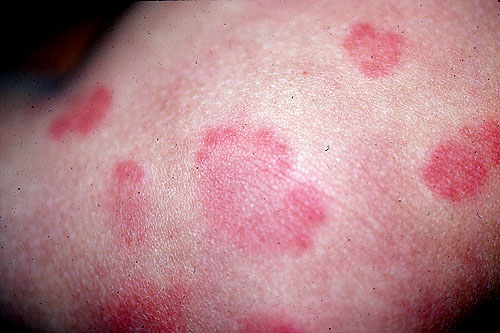This page contains pictures of what hives look like. Hives, also known as urticaria, are extremely common. It is estimated that 15-20% of all people will be affected by hives at some point in their lifetime. Anyone can get hives, but people aged 20 – 30 suffer the greatest number of episodes.
After the pictures of hives there is extensive information about hives including: the types, symptoms, causes and best treatment for hives.
Pictures Of Hives
Click on the pictures of hives for treatment information.


Typical picture of how hives look on an arm.

How hives look on the back.


Pictures of hives (bad case)

Hives Information
Hives can occur anywhere on the body, but most often appear on the arms and legs. They usually appear as rounded or oval swellings on the skin. They are itchy, and can also burn or sting. Often they are red, but not always.
Hives occur when fluid leaks out of blood vessels under the skin. This is caused when a chemical called histamine is released by mast cells under the skin.
Most people believe that hives are the result of an allergic reaction, but many other factors can trigger an outbreak of hives. We will now go over the types of hives, and then discuss the common triggers.
Types Of Hives
There are two types of hives, ordinary hives (ordinary urticaria) and physical hives (physical urticaria).
Ordinary hives appear suddenly and for no apparent reason. These hives look red, swell, and are itchy. They come and go, and can last anywhere from a few minutes to a few hours. Episodes of ordinary hives can last from a few days to weeks. Episodes that last longer than 6 weeks are considered chronic. Chronic (or idiopathic) hives can last months or years. (See the pictures of hives for examples).
Physical hives are caused when something stimulates the skin. Most often, physical hives are caused by scratching. This is referred to as dermatographism. Other stimuli that can cause physical hives include heat or cold, sunlight, exercise, pressure or water. (See the pictures of hives for examples).
Causes Of Hives
Often, the cause of hives is never identified. This is called idiopathic hives.
Common triggers of hives include:
Ordinary hives. Triggers include foods such as peanuts, fish (especially shellfish), chocolate, berries, or diary products. Other potential triggers include: bee stings, viral infections, or medications such as penicillin or aspirin.
Chronic hives. Despite allergy testing and other advanced laboratory tests, the cause of chronic hives is usually never determined.
Physical hives. The most common triggers are cold, sun and water.
Other causes of hives include: stress, perfume or deodorant, pets, fungus, bacteria, mold, pollen, or a disease.
If you have swelling of the tongue or facial swelling; or if you suffer from dizziness, wheezing, chest tightness or breathing difficulties, get immediate medical attention. You may be suffering from anaphylaxis, which can be life threatening
Treatment For Hives
Now that we have seen what hives look like, it is important to discuss treatment.
The first thing most people do is go to their physician. The doctor will attempt to identify the cause of the hives by running tests. The causes usually can’t be identified.
Doctors then usually recommend an antihistamine or a steroid to relieve the symptoms. The goal of this treatment is to help the itching and reduce the number of hives, and hope that the hives go away by themselves. Hives eventually will go away, but they can last for years.
There are no approved medications that can cure hives, and there is no guarantee that they will go away on their own. There is only hope.
There are two problems with this approach: First – these medications only treat the symptoms of hives, not the underlying cause. Second – is that steroids and antihistamines are not intended for long-term use. They can have severe side effects.
As a result, many people look into alternative treatments such as herbal or natural treatments. Natural treatments have no dangerous side effects, and for many people, can be a potential cure for hives.
*** Featured Natural Product ***
At healthy skin guide, we have spent a great deal of time and money researching natural treatments for hives. Our goal is to help you find the best and safest alternative.
We are very happy to have finally found an effective natural treatment for hives called OxyHives.
Although no product will work for everyone, OxyHives is one of the better options we have seen. OxyHives treats the source of the problem, not just the symptoms. OxyHives is taken orally, and helps the body maintain optimal immune system health.
Follow the link to learn more about OxyHives, and see if it’s right for you.
If you have any questions about the what hives look like, please write to us. If you have pictures of hives and would like to contribute them to this website, please contact us.
More than How Hives Look on our Cure For Hives page
Healthy Skin Guide Home Page
